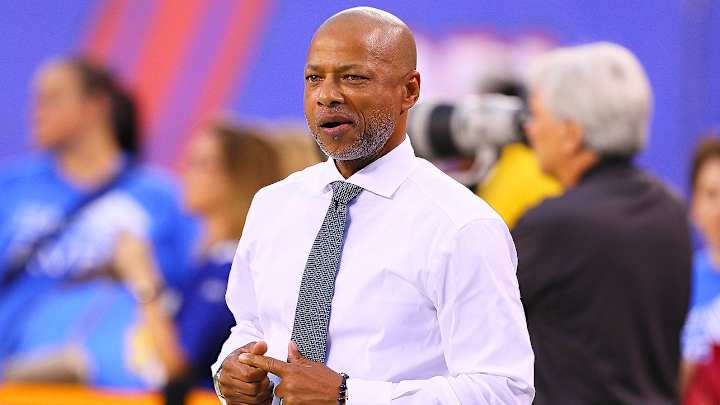Giants GM Jerry Reese Under Fire After Another Unwinnable Press Conference

Giants general manager Jerry Reese woke up on Wednesday to a flurry of brutal headlines after his state-of-the-team address the previous afternoon. While this is a common theme for any roster architect of a losing team—especially one that works in the same building as six content-hungry daily newspapers, two national television networks, the most influential sports talk radio station in the country and a handful of local television outlets—talking publicly at all is becoming a no-win scenario for an executive who has always preferred the peaceful confines of an office or a collegiate practice to scout.
Reese started by blaming himself unequivocally for the Giants’ 1–6 record, but dovetailed into some thoughts that almost countered his initial point.
Consider the following statements (emphasis is mine):
“It was almost like…we came out of the gate, there was a lot of chatter about how good the team looked, how good it looked on paper. Some talk about Super Bowls and things like that. But in this business, the 11 games you won last year, that’s over with, you have to start over. You have to earn wins. You have to do it the right way, you have to put in the preparation and you can’t walk out there and think people are going to just lay down for you, because people are saying good things about you. You have to earn wins in this league and I think we bought into some of the hype of this is a good-looking football team.”
And again…
“You can point to a lot of things, where things have gone wrong. We just have to play better. We have to put players in better positions than we have, and then the players, when we put them in those positions, they have to make plays. You can point to a lot of different things. You know, there were a few close games where the defense couldn’t close games out, some tight games, that last year—we closed those games out…You have to do the little things. We beat ourselves, not taking anything from anyone who beat us, but a lot of things are self-inflicted that happened to us and we gotta clean those things up. It’s pro football, you have to do the little things right, and that starts with preparation. You gotta prepare during the week.”
And again…
“We just didn’t come out with that fight I saw from us last year. I have seen it at times but it hasn’t been consistent enough for us to win games.”
This was all from the opening statement alone. And all of those factors—believing your own hype, mid-week preparation, putting players in better positions, on-field motivation—are not typical responsibilities of a general manager no matter how many times someone says the Giants win and lose as a team. Reese went on to call his offensive line, arguably the team’s biggest weak spot, “comparable” to many across the NFL.
It was reminiscent to another recent snake pit Reese fell into in January 2016 after Tom Coughlin’s farewell address. Perhaps not anticipating that he’d have to defend his personnel while a franchise legend was stepping down, Reese said at the time of a 6–10 record:
“I just know that if you lose eight games by 26 points, most of them in the last seconds of the game, you're not that far away, no matter what you say the personnel is.”
Seahawks Find Their Groove in Second Half and Take Down Giants 24–7
The debacle makes me wonder if the relationship many general managers covet with their fan base (away from the public, free to operate in the shadows until the Super Bowl week victory lap or end-of-season press conference) is fundamentally broken. Many teams prefer their general managers to stay this way because the coach should be the singular voice of a franchise. That doesn’t line up with the current state of NFL fandom, where people are more knowledgeable—and have more access to powerful evaluation tools and databases than ever before. They, like reporters, are aware when there is a question for a play caller and a question for a roster builder. When those questions build up, a natural animus develops.
If the Giants plan to keep their coaching staff and front office intact after this season, maintaining their coveted bridge to the Ernie Accorsi and George Young eras, they’ll need to understand and repair the public perception Reese has constructed for himself during these moments. Owner John Mara hired Reese because of his work behind the scenes. Amid heated personnel disputes, he was the calming voice; the natural leader.
But, when a general manager only emerges from those back rooms every once and a while to publicly discuss a roster that may be falling apart and is automatically in a position where he must defend his own body of work, anything said will naturally be interpreted as defensive and, maybe in this case, a little weak.

Conor Orr is a senior writer for Sports Illustrated, where he covers the NFL and cohosts the MMQB Podcast. Orr has been covering the NFL for more than a decade and is a member of the Pro Football Writers of America. His work has been published in The Best American Sports Writing book series and he previously worked for The Newark Star-Ledger and NFL Media. Orr is an avid runner and youth sports coach who lives in New Jersey with his wife, two children and a loving terrier named Ernie.
Follow ConorOrr